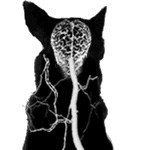Search - All Results
21 - 30 of 1075 results
-
Galloping isn’t such hard work for horses
For the first time, external mechanical work in galloping racehorses has been measured using force plates as ergometers. The results of this study, conducted by Royal Veterinary College (RVC) researchers in the Structure and Motion Laboratory, have … -
RVC team publish work on oestrus suppression in the mare
Dr Madeleine Campbell, Dr Mandi de Mestre, Professor Ken Smith, Daniel Hampshire, Dr Belinda Rose and Lauren Hamstead have recently published the results of their HBLB funded work on the development of a welfare-friendly, ethical method of oestrus …Dr Madeleine Campbell, Dr Mandi de Mestre, Professor Ken Smith, Daniel Hampshire, Dr Belinda Rose …
-
VetCompass study reveals new insights on seizures and epilepsy in cats
Neurological disorders are supposedly a leading cause of death in cats but, until now, there has been little information on how commonly cats are affected by seizure disorders or epilepsy. The latest VetCompass study shines new light on these … -
Article
Plasmapheresis: When the Drugs Don’t Work
Molly, a three-year old springer spaniel with a severe form of immune-mediated haemolytic anaemia (IMHA) was successfully treated by the RVC's Small Animal Emergency Referrals Service with plasmapheresis -
World first, RVC finds cognitive impairments in dogs with epilepsy
A series of pioneering research studies from the Royal Veterinary College (RVC) into dogs with epilepsy have revealed that: Dogs with epilepsy find it harder to obey commands, are slower to learn new tricks, have spatial memory deficits and are easily distracted. Aversive training methods, such as bark-activated collars, prong collars and verbal punishment are associated with poor trainability and their use should be avoided. Some anti-epileptic drugs (the medications commonly used to treat seizures) were found to worsen the cognitive impairment of dogs with epilepsy. Dogs with greater exposure to training activities, including obedience classes, agility, and gun-dog training, were found to be associated with higher trainability and have fewer signs of cognitive dysfunction.You can’t teach epileptic dogs new tricks? A series of pioneering research studies from the Royal …
-
Holly Smith, Head Neurology & Rehabilitation RVN – 30 Year work anniversary
In June 2024 we celebrate a 30-year work anniversary for one of our highly experienced Registered Veterinary Nurse’s, Holly Smith. Holly qualified as an RVN in 1992 and worked in a mixed animal practice in Luton before moving to the QMHA in 1994. …In June 2024 we celebrate a 30-year work anniversary for one of our highly experienced Registered …
-
RVC research sheds light on epilepsy treatments — Why don’t the fits stop?
New research from the Royal Veterinary College (RVC) canine epilepsy clinic has shed light on why some dogs do not respond to anti-epilepsy treatments. The study found that dogs that experience more than one seizure a day and male dogs were less …New research from the Royal Veterinary College (RVC) canine epilepsy clinic has shed light on why …
-
Researchers from Royal Veterinary College (RVC) have found that the effectiveness of testing anti-epileptic drugs (AEDs) for canine epilepsy is far below the expected standard.
The RVC’s canine epilepsy clinic has carried out the first ever systematic review on the efficacy of all AEDs in canine epilepsy. The aim of the study was to assess the effectiveness of each individual AED by analysing all available data that has …The RVC’s canine epilepsy clinic has carried out the first ever systematic review on the efficacy …
-
VetCompass study examines the association between neutering and idiopathic epilepsy in Labradors and Border collies
There is sparse published scientific data on the associations between neutering and the severity and survival of dogs with idiopathic epilepsy. This study used VetCompass™ data on 117 Labrador retrievers and 57 Border collies, diagnosed with … -
New BBSRC grant: Investigating the relationship between epilepsy, drug-resistance and affective disorders in the domestic dog
Investigating the relationship between epilepsy, drug-resistance and affective disorders in the domestic dogA new BBSRC grant has been awarded to Prof Holger Volk, Dr Rowena Packer and Dr Rachel Casey …






